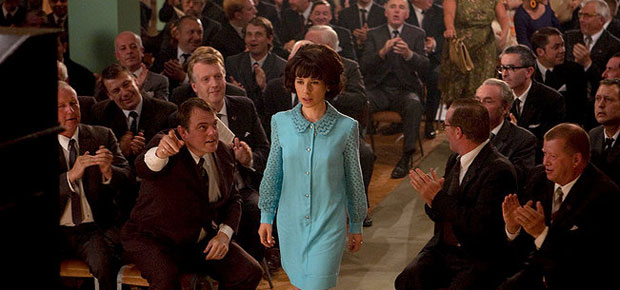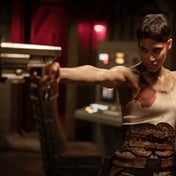
What it's about:
Based on a true story, Made in Dagenham tells the story of a group of women working at Ford Motors' plant in Dagenham, England, whose fight for the right to equal pay changed gender equality in the workplace throughout the world.
What we thought:
Joining the likes of Thelma and Louise, Fried Green Tomatoes and TV's Buffy The Vampire Slayer as part of an elite group of brilliantly entertaining feminist storytelling, Made in Dagenham is noteworthy less for its hefty subject matter than for deft way it deals with it. It would be far too easy to make a film about Feminism and women's right to equal pay, a dreary, sombre, hectoring affair but Made in Dagenham is far too smart for that. In the extremely capable hands of director Nigel Cole and screenwriter William Ivory, a subject that would seem more fitting for the classroom than the movies, is miraculously turned into a spirited, funny, heartfelt and, most importantly, entertaining slice of populist cinema – all the while never losing sight of, let alone betraying, its hefty topic.
And it is very much populist cinema. Made in Dagenham has drawn its share of detractors precisely for being as populist as it is but those critics are missing the point. As, indeed are the censors in the UK and the US who gave the film quite mature "15" and "R" ratings respectively for the film's liberal but – and this is critical – casual use of certain swear words. It's fairly typical for the US's notoriously unreliable MPAA to give a film an undeserved age restriction but the usually impressive British Board of Film Classification really should have known better.
To the great credit of our own Film and Publications Board, the film has the far more fair "no under 10" rating in South Africa. It is, you see, a film that deserves not only a wide audience, but a fairly young one as well. Ten-year-olds might be a bit too young to truly appreciate the subject matter of the film, perhaps, but it is clearly designed to bring in young teenagers as well as adults. The story of these extraordinary ordinary women is one that deserved to be told and, more importantly, seen by as many people as possible – but most especially by young teenage girls, who, I'm sure, will find much to relate and aspire to.
It's impressive enough that Ivory and Cole made a film that appeals to as many people as possible (a feat that is demonstrably not as easy as it looks), but they outdid themselves by making it a pretty damn great piece of cinema as well. Most of the film's harshest critics have set their sights on the film's heart-on-its-sleeve sentimentality but they have overlooked how well-earned that sentimentality truly is.
For a start, every feel-good moment is countered by the harsh realities of working class life in the UK in the late 60s. Things are not easy for these women. The grubby, menial nature of their jobs is matched by often fraught and tumultuous home lives. And that's before they cause even greater friction between one another and those around them by embarking on a crusade that seems hopeless at the time. As such, every small victory and every mighty triumph feels well-deserved and if the film is "the feel-good movie of the year", a title that it may well share proudly with The Concert, it's only because its sentimentality comes with genuine heartfelt good-nature and genuine triumph over diversity.
Another major criticism hurled at the film is that it is too soap-operatic, but that too misses the point. Made in Dagenham works as well as it does because, for all of its quirks and indie appeal, socialist and feminist politics, it's about these relatable, ordinary women and how what they're justly fighting for affects their lives. And if that means that the film will have to deal with such "soap-opera" elements as betrayal, conflict between spouses and friends falling out and making up, then so be it. Especially because what some might call "soap opera" I prefer to simply call character development.
And what characters these are. And, for that matter, how great the actors are that play them. We have a wonderful supporting cast of characters from Bob Hoskins as the wonderfully likeable male-figure who stands behind the women to Richard Schiff, wonderful again as the American presence in an otherwise British film, even if his role is both sinister and small. At the heart of the film though are three incredible women played by three incredible actresses.
Rosamund Pike has never been better as the rich wife of the man who stands in the women's way but whose motives may be far nobler than they first appear. Miranda Richardson, meanwhile, almost steals the show as Barbara Castle, the Labour politician with a sharp mind and sharper tongue who may well be the key to these women's salvation – but only if she can resist the pressures of her male superiors. Best of all is Sally Hawkins as the reluctant leader of the women's cause and the star of the film. It's a role that calls for vulnerability, toughness, sweetness, humour and emotional complexity and Hawkins more than delivers on every front.
The same in fact, might be said about the film itself.
Based on a true story, Made in Dagenham tells the story of a group of women working at Ford Motors' plant in Dagenham, England, whose fight for the right to equal pay changed gender equality in the workplace throughout the world.
What we thought:
Joining the likes of Thelma and Louise, Fried Green Tomatoes and TV's Buffy The Vampire Slayer as part of an elite group of brilliantly entertaining feminist storytelling, Made in Dagenham is noteworthy less for its hefty subject matter than for deft way it deals with it. It would be far too easy to make a film about Feminism and women's right to equal pay, a dreary, sombre, hectoring affair but Made in Dagenham is far too smart for that. In the extremely capable hands of director Nigel Cole and screenwriter William Ivory, a subject that would seem more fitting for the classroom than the movies, is miraculously turned into a spirited, funny, heartfelt and, most importantly, entertaining slice of populist cinema – all the while never losing sight of, let alone betraying, its hefty topic.
And it is very much populist cinema. Made in Dagenham has drawn its share of detractors precisely for being as populist as it is but those critics are missing the point. As, indeed are the censors in the UK and the US who gave the film quite mature "15" and "R" ratings respectively for the film's liberal but – and this is critical – casual use of certain swear words. It's fairly typical for the US's notoriously unreliable MPAA to give a film an undeserved age restriction but the usually impressive British Board of Film Classification really should have known better.
To the great credit of our own Film and Publications Board, the film has the far more fair "no under 10" rating in South Africa. It is, you see, a film that deserves not only a wide audience, but a fairly young one as well. Ten-year-olds might be a bit too young to truly appreciate the subject matter of the film, perhaps, but it is clearly designed to bring in young teenagers as well as adults. The story of these extraordinary ordinary women is one that deserved to be told and, more importantly, seen by as many people as possible – but most especially by young teenage girls, who, I'm sure, will find much to relate and aspire to.
It's impressive enough that Ivory and Cole made a film that appeals to as many people as possible (a feat that is demonstrably not as easy as it looks), but they outdid themselves by making it a pretty damn great piece of cinema as well. Most of the film's harshest critics have set their sights on the film's heart-on-its-sleeve sentimentality but they have overlooked how well-earned that sentimentality truly is.
For a start, every feel-good moment is countered by the harsh realities of working class life in the UK in the late 60s. Things are not easy for these women. The grubby, menial nature of their jobs is matched by often fraught and tumultuous home lives. And that's before they cause even greater friction between one another and those around them by embarking on a crusade that seems hopeless at the time. As such, every small victory and every mighty triumph feels well-deserved and if the film is "the feel-good movie of the year", a title that it may well share proudly with The Concert, it's only because its sentimentality comes with genuine heartfelt good-nature and genuine triumph over diversity.
Another major criticism hurled at the film is that it is too soap-operatic, but that too misses the point. Made in Dagenham works as well as it does because, for all of its quirks and indie appeal, socialist and feminist politics, it's about these relatable, ordinary women and how what they're justly fighting for affects their lives. And if that means that the film will have to deal with such "soap-opera" elements as betrayal, conflict between spouses and friends falling out and making up, then so be it. Especially because what some might call "soap opera" I prefer to simply call character development.
And what characters these are. And, for that matter, how great the actors are that play them. We have a wonderful supporting cast of characters from Bob Hoskins as the wonderfully likeable male-figure who stands behind the women to Richard Schiff, wonderful again as the American presence in an otherwise British film, even if his role is both sinister and small. At the heart of the film though are three incredible women played by three incredible actresses.
Rosamund Pike has never been better as the rich wife of the man who stands in the women's way but whose motives may be far nobler than they first appear. Miranda Richardson, meanwhile, almost steals the show as Barbara Castle, the Labour politician with a sharp mind and sharper tongue who may well be the key to these women's salvation – but only if she can resist the pressures of her male superiors. Best of all is Sally Hawkins as the reluctant leader of the women's cause and the star of the film. It's a role that calls for vulnerability, toughness, sweetness, humour and emotional complexity and Hawkins more than delivers on every front.
The same in fact, might be said about the film itself.




 Publications
Publications
 Partners
Partners










